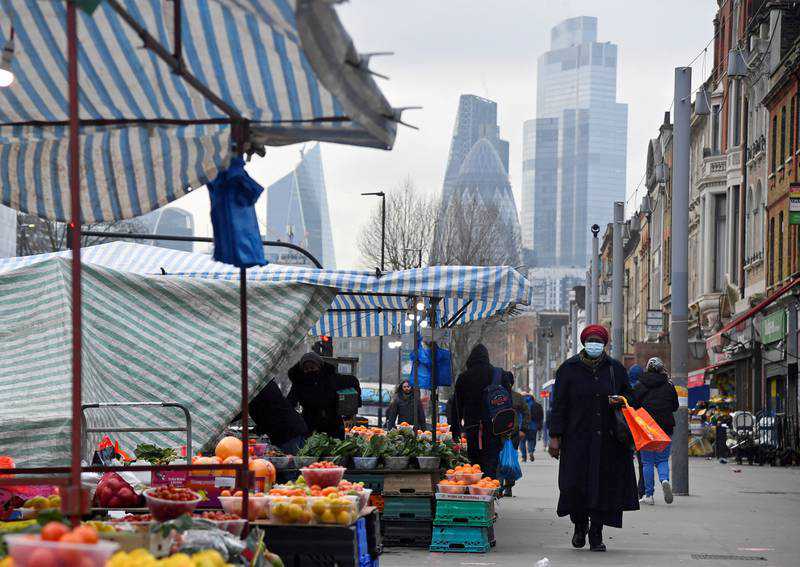UK economy slows sharply in third quarter as Covid recovery falters

Britain’s economic growth slowed sharply in the third quarter, with gross domestic product growing just 1.3 per cent in a further sign the economic recovery is faltering amid supply chain challenges.
The lower growth in the three months to September 30 was a marked slowdown on the 5.5 per cent growth recorded in the second quarter, according to the Office for National Statistics, when easing coronavirus restrictions caused a rebound in activity.
Despite the faltering growth, Chancellor of the Exchequer Rishi Sunak was upbeat and said the economy is continuing its recovery from Covid “thanks to schemes like furlough” with the unemployment rate falling for eight months in a row and Britain on track for the fastest growth in the G7 this year.
“As the world reopens we know that there are still challenges to overcome,” Mr Sunak said.
“We’re continuing to support businesses, jobs and people so that we can achieve our vision of a high-skill, high-productivity economy where work is rewarded.”
While the UK’s services sector was the biggest driver of growth, expanding 1.6 per cent over the three-month period, with accommodation and food services expanding 30 per cent and the arts and entertainment by 19.6 per cent, other sectors were less buoyant.
Production and construction output fell, reflecting challenges caused by rising material and labour costs along with supply chain issues.
There was a glimmer of hope in the GDP figures, however, with a pick-up in growth in September of 0.6 per cent caused by a rush to buy houses before the end of the stamp duty holiday on September 30.
But revisions showed that the performance was worse than first thought in July and August, with signs the global supply chain issues were taking their toll.
Data showed a 0.2 per cent contraction in July, against the 0.1 per cent fall previously estimated, while August showed growth of 0.2 per cent, against the 0.4 per cent initial reading.
ONS chief economist Grant Fitzner said the supply chain issues were hampering growth, with the uplift from the rush to buy houses before the end of the stamp duty holiday "partially offset by falls in the manufacture and sale of cars" after the industry was hit by a shortage of semiconductor chips.
“Notably, business investment remained well down on pre-pandemic levels in the three months to September," Mr Fitzner said.
"Meanwhile the trade deficit widened as goods exports to non-EU countries fell and imports – particularly of fuel – from non-EU countries increased.”
The UK economy is still 2.1 per cent smaller than it was in the final three months of 2019, the ONS said, before the Covid-19 crisis struck.
Paul Dales, chief UK economist at Capital Economics, said some of the momentum seen at the end of third quarter will fizzle out over the coming months.
“The big point is that the best of the recovery is now behind us,” he said.
“And we think progress is going to slow over the next six to nine months as shortages remain an issue and the real spending power of businesses and households is reduced by higher taxes and rising utility prices."
The growth slowdown raises the threat of so-called stagflation – slowing growth combined with rising inflation – as the cost of living soars higher with rising energy and fuel costs adding to price increases due to supply issues.
The Bank of England has warned that inflation will jump to 4.5 per cent by the end of November, from 3.1 per cent now, and hit 5 per cent next April, the highest level for a decade.
Danni Hewson, AJ Bell financial analyst, said the hope had been that once all Covid restrictions were removed, "the economic engine would be revved and ready", but that is far from the case with the outlook looking bleaker as supply chain challenges persist.
“Household spend has played a huge part in propelling the UK economy forward over the last six months, but those households are now feeling the squeeze of rising prices. Government support measures have tapered off and trade is, in a word, disappointing.,” she said.
“The UK is in danger of being left behind by many of its European counterparts and without decent growth and sustained productivity, the dream of a high-wage economy is one that starts to look a little shaky.”
Previous Story
- Rolls-Royce gets funding to develop mini nuclear reactors
- New York gears up for tourists' return as...
- Countries pledge to quit coal — but the...
- Bill Gates doubts goal of limiting global warming...
- Database firm Clearview AI told to remove photos...
- How more of us are leaving screens behind...
- Leaders agree global plan to boost green technology
- COP26: UK firms forced to plan for low-carbon...